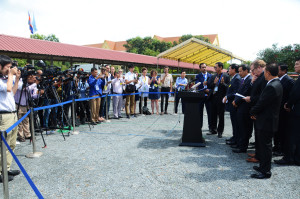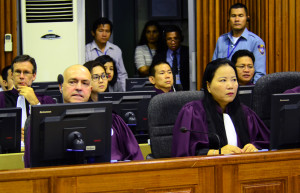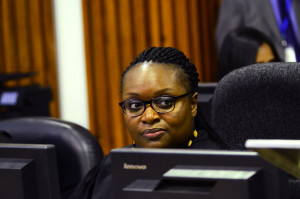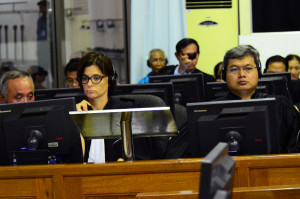Praise and Frustration: Appeal Judgment in Case 002/01
Today’s appeal judgment in Case 002/01 received praise after its pronouncement, but some criticism of the judgment could also be heard (click here for a summary of the judgment).
After the Appeal Judgment was rendered, government officials H.E. Chan Tany and H.E. Keo Remy, Secretaries of State at the Office of the Council of Ministers in the Royal Government of Cambodia, and Ambassador David Scheffer, U.N. Secretary-General’s Special Expert on United Nations Assistance to the Khmer Rouge Trials, provided statements to the press. This was followed by a press conference, in which the parties – the Co-Prosecution, the Civil Party Lead Co-Lawyers and both defense teams – gave their first impressions on the judgment in front of a crowd of approximately 40 journalists.
Chan Tany was the first one to speak and defined this a “historic day for Cambodia and also the world,” pointing to the long-awaited judgment. It was an “unprecedented trial” that served to adjudicate on mass atrocities and was a step to prevent the recurrence of such a crimes, “no matter where they happen.” He highlighted the contribution of the Royal Government of Cambodia with its logistical and financial support as well as its contribution of human resources.

Chan Tany, Keo Remy and David Scheffer speak in front of media representatives (ECCC: Flickr).
Keo Remy also found praise for the proceedings. “Today is the day to reflect on the achievements we have made,” he said. He then read a statement on behalf of Sok An, Deputy Prime Minister. The purpose of the proceedings was to “seek justice as the most significant way to pay respect” to the deceased and to prevent repetition. Drawing comparison to Post World-War-II-Germany, he said that it was “ the most important case since Nuremberg.” Sok An – in the speech read out by H.E. Remy – praised the contributions of UN member states, ranging from $ 500 (Namibia) to $ 83 million (Japan). Looking back at the hearing days, he highlighted the special role of Civil Parties, which no other international tribunal recognized. He hoped that the tribunal would establish a legacy for the coming generation by providing sound jurisprudence.
The third and last of the speakers, Ambassador David Scheffer, took a moment to “remember those who survived” and expressed his hope that this judgment would bring some relief to their suffering. Also comparing the situation to post-war Germany, Ambassador Scheffer titled the day as the “first Nuremberg moment of the court”, and the forthcoming judgment in Case 002/02 as the “second Nuremberg moment.” Aligning with the other two speakers, he called it a “historic moment for the country of Cambodia.” Not only did the judgment contribute to International Criminal Justice, but it also “demonstrated the value of an appeals process.” Some of the Trial Chamber’s holdings were upheld and some were reversed. Ambassador Scheffer took the opportunity to address the Cambodian public and remind them of their right to seek appeal decisions in Cambodian courts: “Guess what, you have an appeal process, even in your own court. And that should be made use of.”
Referencing leaders of other nations, he praised the judgment as a proof that the “long arm of international justice can prevail.” He specifically mentioned the senior leaders of the Philippines, Sudan and South Sudan, the Central African Republic, Syria, and ISIS in Syria and Iraq. After his statement was translated into Khmer, he added: “The leadership of North Korea should take particular note of what occurred here today.”
With these words in their ears, the journalists made their way to the public gallery where the press conference was held. Court spokesman Lars Olsen, who will be leaving the country on Friday, gave a brief summary of the judgment and, also titled it a “historic day.”
Co-Prosecution Mainly Satisfied
The Co-Prosecution was the first party to be given the opportunity to evaluate the judgment and answer questions by the press. National Prosecutor Chea Leang stressed the success of the case. “Today is the day we receive the light of justice,” she said. They had been successful in prosecuting those who were responsible for crimes. Her international colleague Nicholas Koumjian pointed to the significance of Civil Parties and witnesses and submitted that “they are absolutely essential.” In these lines, he acknowledged that it was difficult for them to relive their suffering in the courtroom, but that without them this judgment would not have taken place. He hoped that the judgment would “provide victims some measure of peace” and “some knowledge that the world acknowledges the suffering.”

Co-Prosecutors Nicholas Koumjian and Chea Leang (ECCC: Flickr).
He admitted that the Co-Prosecution was disappointed with some aspects of the appeal judgment, but stressed that they understood that judges were a neutral entity that did necessarily reach the conclusions that the Co-Prosecution deemed reasonable. “The ultimate result is justice.” Asked about the dismissal of their appeal, Mr. Koumjian explained that the Supreme Court Chamber had considered the applicability of Joint Criminal Enterprise (JCE). He deemed that the chamber had reached a “finding that is different from findings of other international courts.” Despite slight frustration at this point, Mr. Koumjian said that there was no need for JCE III in Case 002; it therefore did not have any influence on this case. He declined to comment on other cases and the applicability of JCE modes of liability.
As the last statement of the Co-Prosecution, Ms. Leang remarked that this judgment “Now, Cambodia is a state of law, and we try to eradicate impunity.”
Mixed Feelings at Defense Teams
National Khieu Samphan Defense Counsel Kong Sam Onn said they could not give any detailed comment before having read the judgment in full. His international colleague Anta Guissé condemned it nonetheless. She used a metaphor to convey her opinion on the judgment: “Doors [at the tribunal] were repainted […] so that people come in their lovely suits,” she said. The same applied to the judgment. That some grounds of appeal were recognized by the Supreme Court Chamber, she said, “that doesn’t really make a difference.” She called this process “cosmetic justice.” The decision was “a symbolic decision”, she explained and expressed her frustration that, in her view, the “law had disappeared before the symbol.”

International Khieu Samphan Defense Counsel Anta Guissé (ECCC: Flickr).
Nuon Chea Defense Counsel Victor Koppe painted a different picture. In contrast to his colleague from the Khieu Samphan Defense Team, he said he was “pleasantly surprised” by the judgment, but added that “this was not difficult” as they previously “had zero expectations.” He had spoken to Nuon Chea, who was, according to Mr. Koppe’s words, “delighted” in particular about his acquittal in relation to Tuol Po Chrey. He said that the Supreme Court Chamber had raised standards of accepting proof, which would have a “substantial impact on ongoing cases.” Despite this surprisingly positive evaluation, he said he did not understand how the Supreme Court Chamber could still hand down a life sentence. Materially, it did not matter, but symbolically it did. He concluded his opening remarks by saying that the “Prosecution is in big trouble. I think they realize that.”
Asked whether he retracted his earlier statement that the Appeal Judgment was “irrelevant”, he said that he viewed it less harsh now, but that the Trial Chamber was so biased that it was unlikely that they would take the judgment into account appropriately. It was therefore “substantially irrelevant”, as ongoing Case 002/02 was to be concluded soon.
The microphone being given back to the Khieu Samphan Defense Team, Kong Sam Onn said that the judgment raised “a lot of confusing points. Participating in the revolution is not criminal to me.” He said he could not understand how Khieu Samphan could be found guilty in the participation of a policy, as there was not sufficient evidence that he supported the evacuation Phase I and II.
Mr. Koppe seemed to be looking at the Trial Chamber when saying that that Nuon Chea had indicated that he might talk if Heng Samrin was called. “It is all up to the Trial Chamber to call Heng Samrin.”
Ms. Guissé concluded the defense team’s session by being very clear. “Yes, we are disappointed. The law erased itself before the symbol.”
Civil Party Lead Co-Lawyers Satisfied
National Civil Party Lead Co-Lawyer Pich Ang welcomed the pronouncements, as this meant the “elimination of impunity”. He called the participation of the Civil Parties a success and said that the reparations were “very good for the victims.” His colleague Marie Guiraud said that she sensed a “feeling of satisfaction” when she had debriefed around 100 Civil Parties who were present at the court. Life imprisonment had been confirmed for both accused and a “long process has come to an end.” Over a hundred Civil Parties had died since the proceedings started, she said.

Civil Party Lead Co-Lawyers Marie Guiraud and Pich Ang
Having briefly looked at the judgment that the parties had been notified with around an hour prior to her appearance at the press conference, she said that it seemed to adhere to a “high legal level.” She also pointed to the fact that there was no dissenting opinion, which she interpreted as the Cambodian and international judges recalling the principles of impartiality. “This is a victory, personally speaking, for the Civil Parties as well.”
For the Civil Parties, the rendering of the final judgment also meant that their reparations would now be implemented. As matter of example, Ms. Guiraud explained that the Trial Chamber had recognized a National Day of Remembrance, which would be implemented as of 2017.
She reiterated that it was important for victims that the right of the defense was upheld, as only then a meaningful judgment could be rendered. “Justice has been done.” Mr. Ang repeated that this was “a very important symbolic effort for Cambodia and other countries.” He expressed his appreciation for the Civil Parties. “They were very brave to participate in the proceedings.” Ms. Guiraud joined this appraisal and said that she wanted to “pay homage to the Civil Parties” who had joined them in the process that she called an “adventure.”
She concluded: “I have kind thoughts for these men and women.”
